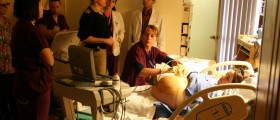
Down syndrome is caused by an abnormality in the chromosomes. In each cell of a Down syndrome person, there are 47 instead of 46 chromosomes. The condition is rarely inherited, and is normally caused as a result of a mistake in cell division. Around one out of every 700 children are born with Down syndrome. Mothers over the age of 45 are at a relatively high risk of giving birth to a Down syndrome baby.
Symptoms and complications
The condition causes varying levels of mental retardation. Those affected by the condition also tend to share similar physical characteristics. These characteristics include a small head, protruding tongue, flattened facial features, unusually shaped ears, upward slanting eyes, lack of muscle tone, shorter fingers and hands, smaller size and excessive flexibility.
There are some complications that can arise due to Down syndrome, including leukemia, heart defects, gastrointestinal blockages, thyroid problems, visual problems, hearing loss and infectious diseases.
Diagnosis
Down syndrome can be identified before birth. Screening for the condition is a routine part of prenatal care. The best time for testing is around the eleventh and fourteenth weeks of pregnancy.
Should screening make clear some abnormalities, other tests, such as amniocentesis, choronic villus sampling or percutaneous umbilical blood sampling might also be performed. If it is suspected that a baby is born with Down syndrome, a doctor might order a chromosomal karotype. This will help confirm the diagnosis of Down syndrome.
Treatment for Down Syndrome
As of now, there is no available medical cure with regard to the treatment of Down syndrome. Instead, treatment will focus on the addressing and prevention of medical complications that are related to Down syndrome. This includes conditions such as leukemia, heart defects, hearing problems and gastrointestinal problems. It becomes important to properly address the potential complications of the condition. In this regard, there are numerous types of medical professionals who will be involved in the treatment of Down syndrome people. This includes professionals such as speech pathologists, occupational therapists and physical therapists.
Celiac disease and Down syndrome
There have been several studies performed that have examined the link between Down syndrome and celiac disease. These studies have indicated that around five to ten per cent of those with Down syndrome also suffer from celiac disease. In general, this occurs mainly due to the fact that those with Down syndrome are more vulnerable to the onset of autoimmune diseases, in comparison to the general population.

















Your thoughts on this
Loading...